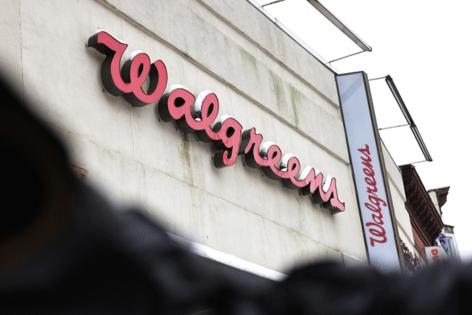Editorial: Will a bloated Walgreens, troubled for years, swallow a bitter pill for Chicago?
Published in Op Eds
After more than a century as a fixture on Main Streets across the country, one of Chicago’s signature companies is grabbing at a lifeline.
The Wall Street Journal reported that Walgreens Boots Alliance has engaged in talks to go private, which would end its nearly century-long run as a public company. The reported potential buyer is Sycamore Partners, a private-equity firm based in New York. A Sycamore senior adviser, retail veteran John A. Lederer, has served on the drugstore chain’s board of directors since 2015 — so the New Yorkers presumably know what they would be getting into.
Walgreens has been sinking for years.
In its most recent earnings report, the Deerfield, Illinois-based company admitted it was losing money at the rate of $1 billion a month. Its market value plunged from a peak of $100 billion to less than $8 billion before news of the possible Sycamore deal gave the stock a modest boost, including a roughly 5% rise on Friday, when advanced financing talks meant the deal appeared more likely (if hardly certain) to go through.
The company already has announced plans to close 1,200 underperforming stores, and hundreds more are on the block unless an unlikely turnaround occurs. Given its hefty debt load, bankruptcy is a possibility if the mating dance with Sycamore should stumble.
What happened to this iconic merchant, which enjoyed great success when led by the founding Walgreen family and its descendants? In short, Walgreens got a lot bigger, but not better.
It operates in a retail sector under siege from tough competitors like Amazon and Walmart. Profit-hungry pharmacy benefit managers are squeezing its core prescription drug business, as this page recently chronicled. And customers leaning into online shopping are less inclined to visit their local brick-and-mortar store for the vitamins, cosmetics, snacks and drinks that in the past padded out the company’s sales. When customers do visit the aesthetically grim stores, too often the experience is disappointing.
Chicagoans who know Walgreens as a local company with familiar outlets across the area might be surprised to learn that it has turned into an intercontinental handful.
Walgreens was Walgreens until 2014, when it changed its name to reflect the purchase of Boots, the United Kingdom’s largest and once beloved pharmacy chain. That was just one of several costly acquisitions likely to be unwound as the company struggles to revive itself.
As of fiscal 2023, Walgreens had $140 billion in sales, 13,000 retail pharmacies in nine countries and more than 330,000 employees. That massive scale should have given its buyers tremendous leverage when purchasing prescription drugs and other products, but size did not equate to profit.
Walgreens also made a foray into providing primary care with a big investment in the VillageMD chain. That deal seemed like a good fit, but the company couldn’t make it work.
What a surprise, given the strategy it articulated so very clearly in public filings: “The company offers a connected healthcare experience that can help drive better outcomes within communities, as it continues to accelerate the shift to value-based care, which prioritizes quality of patient care over quantity of services provided.”
Say what? All that jargon indicates fuzzy thinking at the top.
Indeed, Walgreens’ biggest strategic advantage of all — its central role in delivering health care — has failed to pay off.
Vaccination and testing services made its staff into heroes during the COVID-19 pandemic. Prescription drugs increasingly are the first line of treatment for many medical conditions, and more patients than ever have insurance coverage helping to pay for their scripts. Consumers faced with a complicated health care system want the kind of convenient, accessible service Walgreens is set up to provide.
So where are the profits? Private-equity firms like Sycamore know how to solve that problem, at least in the short run, and it isn’t pretty.
If a buyout of Walgreens goes through, watch for many more store closings and mass layoffs. A sharp buyer is likely to break up the company and unload some of the assets. Candidates include retail drugstore chains it owns like Boots, Duane Reade and Mexico’s Benavides. Private-label brands such as Nice! could be sold off as well.
Going private would reduce the scrutiny Walgreens receives as a public company. Elected officials who rightly worry about pharmacy “deserts” expanding in disadvantaged communities can complain all they want: Private-equity owners have a reputation for ignoring political niceties.
And, in fact, Walgreens probably needs shock treatment to pull out of its slump, or others will continue to fill the void.
Archrival CVS is suffering from many of the same ills as Walgreens, having overexpanded through acquisition and failed to achieve its financial objectives. Sad to say, nothing would help it more over the short term than its most direct competitor getting slashed and burned.
From dollar stores to supermarkets to warehouse-style operations like Costco, other retailers are chipping away at the traditional business done by local drugstores. And neither Walgreens nor CVS has managed to develop an online presence that measures up to their smartest e-commerce competitors.
For Chicago, the prospect of a private-equity deal for such a historic homegrown company is chilling. Even if the corporate headquarters were to officially remain in the area, outside owners would be calling the shots.
Walgreens is an important local employer and has made changes to help front-line workers who suffered from burnout after going above and beyond during the pandemic. For all its business problems, the retailer has been a responsive corporate citizen, and every day it provides health services that can literally make the difference between life and death in the communities it serves.
We’re rooting for Walgreens, and we hope the outcome of this latest Hail Mary is better than the rough time ahead we anticipate.
Walgreens, heal thyself.
___
©2024 Chicago Tribune. Visit at chicagotribune.com. Distributed by Tribune Content Agency, LLC.




























































Comments